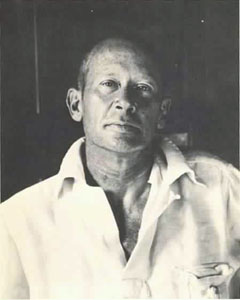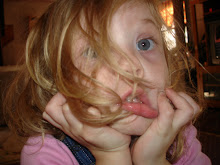| I Am Not Yours | ||
| by Sara Teasdale | ||
I am not yours, not lost in you, | ||
Sunday, April 13, 2008
| Daughters, 1900 | ||
| by Marilyn Nelson | ||
Five daughters, in the slant light on the porch, | ||
| A Little Tooth | ||
| by Thomas Lux | ||
Your baby grows a tooth, then two, | ||
| Infant Joy | |||||||
| by William Blake | |||||||
"I have no name:
| |||||||
| Answer to a Child's Question | ||
| by Samuel Taylor Coleridge | ||
Do you ask what the birds say? The Sparrow, the Dove, | ||
| My Lost Youth | |||||
| by Henry Wadsworth Longfellow | |||||
Often I think of the beautiful town
| |||||
Elegy for Jane by Theodore Roethke
I remember the neckcurls, limp and damp as tendrils;And her quick look, a sidelong pickerel smile;
And how, once startled into talk, the light syllables leaped for her,
And she balanced in the delight of her thought,
A wren, happy, tail into the wind,
Her song trembling the twigs and small branches.
The shade sang with her;
The leaves, their whispers turned to kissing,
And the mould sang in the bleached valleys under the rose.
Oh, when she was sad, she cast herself down into such a pure depth,
Even a father could not find her:
Scraping her cheek against straw,
Stirring the clearest water.
My sparrow, you are not here,
Waiting like a fern, making a spiney shadow.
The sides of wet stones cannot console me,
Nor the moss, wound with the last light.
If only I could nudge you from this sleep,
My maimed darling, my skittery pigeon.
Over this damp grave I speak the words of my love:
I, with no rights in this matter,
Neither father nor lover.
 Theodore Roethke (1908-1963) was born in Saginaw, Michigan. As a child, he spent much time in the greenhouse owned by his father and uncle. His impressions of the natural world contained there would later profoundly influence the subjects and imagery of his verse. Stylistically his work ranged from witty poems in strict meter and regular stanzas to free verse poems full of mystical and surrealistic imagery. At all times, however, the natural world in all its mystery, beauty, fierceness, and sensuality, is close by, and the poems are possessed of an intense lyricism.
Theodore Roethke (1908-1963) was born in Saginaw, Michigan. As a child, he spent much time in the greenhouse owned by his father and uncle. His impressions of the natural world contained there would later profoundly influence the subjects and imagery of his verse. Stylistically his work ranged from witty poems in strict meter and regular stanzas to free verse poems full of mystical and surrealistic imagery. At all times, however, the natural world in all its mystery, beauty, fierceness, and sensuality, is close by, and the poems are possessed of an intense lyricism.
EE Cummings
since feeling is first
By E.E. Cummings
since feeling is first
who pays any attention
to the syntax of things
will never wholly kiss you;
wholly to be a fool
while Spring is in the world
my blood approves,
and kisses are a far better fate
than wisdom
lady i swear by all flowers. Don't cry
—the best gesture of my brain is less than
your eyelids' flutter which says
we are for each other: then
laugh, leaning back in my arms
for life's not a paragraph
And death i think is no parenthesis
 Cummings (1894-1962) discovered an original way of describing the chaotic immediacy of sensuous experience. He played games with language and form and put forth a deliberately simplistic view of the world, giving his poems have a gleeful and precocious tone. He was born in Cambridge, Mass., attended Harvard and studied Art in Paris.
Cummings (1894-1962) discovered an original way of describing the chaotic immediacy of sensuous experience. He played games with language and form and put forth a deliberately simplistic view of the world, giving his poems have a gleeful and precocious tone. He was born in Cambridge, Mass., attended Harvard and studied Art in Paris.
By E.E. Cummings
since feeling is first
who pays any attention
to the syntax of things
will never wholly kiss you;
wholly to be a fool
while Spring is in the world
my blood approves,
and kisses are a far better fate
than wisdom
lady i swear by all flowers. Don't cry
—the best gesture of my brain is less than
your eyelids' flutter which says
we are for each other: then
laugh, leaning back in my arms
for life's not a paragraph
And death i think is no parenthesis
 Cummings (1894-1962) discovered an original way of describing the chaotic immediacy of sensuous experience. He played games with language and form and put forth a deliberately simplistic view of the world, giving his poems have a gleeful and precocious tone. He was born in Cambridge, Mass., attended Harvard and studied Art in Paris.
Cummings (1894-1962) discovered an original way of describing the chaotic immediacy of sensuous experience. He played games with language and form and put forth a deliberately simplistic view of the world, giving his poems have a gleeful and precocious tone. He was born in Cambridge, Mass., attended Harvard and studied Art in Paris.
First Memory
Long ago, I was wounded. I lived
to revenge myself
against my father, not
for what he was—
for what I was: from the beginning of time,
in childhood, I thought
that pain meant
I was not loved.
It meant I loved.
 Louise Glück was born in New York City in 1943 and grew up on Long Island. She is the author of numerous books of poetry, most recently, Averno, a finalist for the 2006 National Book Award in Poetry. In 1999, she was elected a Chancellor of The Academy of American Poets. In the fall of 2003, she was named Poet Laureate of the United States.
Louise Glück was born in New York City in 1943 and grew up on Long Island. She is the author of numerous books of poetry, most recently, Averno, a finalist for the 2006 National Book Award in Poetry. In 1999, she was elected a Chancellor of The Academy of American Poets. In the fall of 2003, she was named Poet Laureate of the United States.
Long ago, I was wounded. I lived
to revenge myself
against my father, not
for what he was—
for what I was: from the beginning of time,
in childhood, I thought
that pain meant
I was not loved.
It meant I loved.
 Louise Glück was born in New York City in 1943 and grew up on Long Island. She is the author of numerous books of poetry, most recently, Averno, a finalist for the 2006 National Book Award in Poetry. In 1999, she was elected a Chancellor of The Academy of American Poets. In the fall of 2003, she was named Poet Laureate of the United States.
Louise Glück was born in New York City in 1943 and grew up on Long Island. She is the author of numerous books of poetry, most recently, Averno, a finalist for the 2006 National Book Award in Poetry. In 1999, she was elected a Chancellor of The Academy of American Poets. In the fall of 2003, she was named Poet Laureate of the United States.
Today I will begin with some Shel Silverstein
And before the street begins,
And there the grass grows soft and white,
And there the sun burns crimson bright,
And there the moon-bird rests from his flight
To cool in the peppermint wind.
Let us leave this place where the smoke blows black
And the dark street winds and bends.
Past the pits where the asphalt flowers grow
We shall walk with a walk that is measured and slow,
And watch where the chalk-white arrows go
To the place where the sidewalk ends.
Yes we'll walk with a walk that is measured and slow,
And we'll go where the chalk-white arrows go,
For the children, they mark, and the children, they know
The place where the sidewalk ends.

 Silverstein's work, which he illustrated himself, is characterized by a deft mixing of the sly and the serious, the macabre and the just plain silly. His wicked, giddy humor is beloved by countless adults as well as by children. He died in May 1999.
Silverstein's work, which he illustrated himself, is characterized by a deft mixing of the sly and the serious, the macabre and the just plain silly. His wicked, giddy humor is beloved by countless adults as well as by children. He died in May 1999.
Where the Sidewalk Ends by Shel Silverstein
There is a place where the sidewalk endsAnd before the street begins,
And there the grass grows soft and white,
And there the sun burns crimson bright,
And there the moon-bird rests from his flight
To cool in the peppermint wind.
Let us leave this place where the smoke blows black
And the dark street winds and bends.
Past the pits where the asphalt flowers grow
We shall walk with a walk that is measured and slow,
And watch where the chalk-white arrows go
To the place where the sidewalk ends.
Yes we'll walk with a walk that is measured and slow,
And we'll go where the chalk-white arrows go,
For the children, they mark, and the children, they know
The place where the sidewalk ends.

 Silverstein's work, which he illustrated himself, is characterized by a deft mixing of the sly and the serious, the macabre and the just plain silly. His wicked, giddy humor is beloved by countless adults as well as by children. He died in May 1999.
Silverstein's work, which he illustrated himself, is characterized by a deft mixing of the sly and the serious, the macabre and the just plain silly. His wicked, giddy humor is beloved by countless adults as well as by children. He died in May 1999.
Subscribe to:
Comments (Atom)



